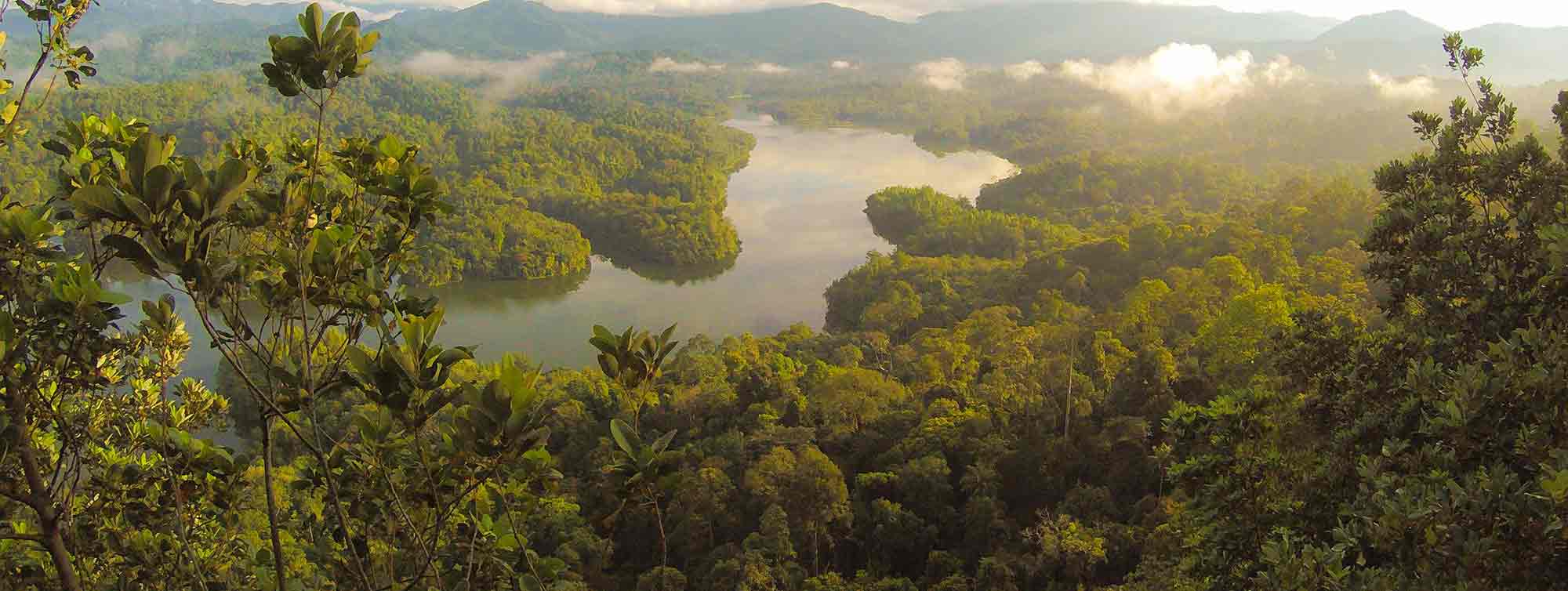432 Resources

Op-Ed: Does the Bay Area Have the Water It Needs to Grow?
October 29, 2021 | publication
It seems as though the two things the Bay Area has the least of are housing and water. The region has a shortfall of 699,000 housing units, which has driven housing costs to astronomical heights, and pushed 35,000 of our neighbors into temporary housing or onto the streets. Our colleagues at San Francisco Bay Area Planning and Urban Research Association (SPUR),a public policy think tank, have found that the region needs to build an astonishing 2.2 million homes by 2070 to meet future demand and make up for the present shortfall.
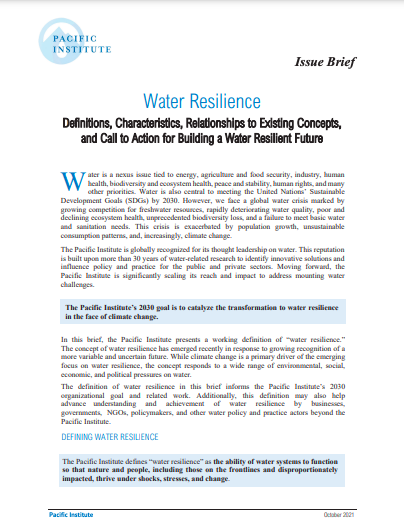
Water Resilience
October 29, 2021 | publication
The world is facing a global water crisis marked by growing competition for freshwater resources, rapidly deteriorating water quality, poor and declining ecosystem health, unprecedented biodiversity loss, and a failure to meet basic water and sanitation needs.
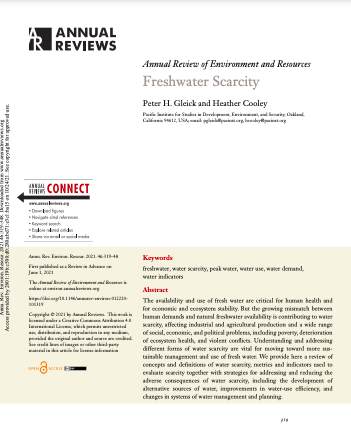
Freshwater Scarcity
October 24, 2021 | publication
The availability and use of fresh water are critical for human health and for economic and ecosystem stability. But the growing mismatch between human demands and natural freshwater availability is contributing to water scarcity, affecting industrial and agricultural production and a wide range of social, economic, and political problems, including poverty, deterioration of ecosystem health, and violent conflicts.
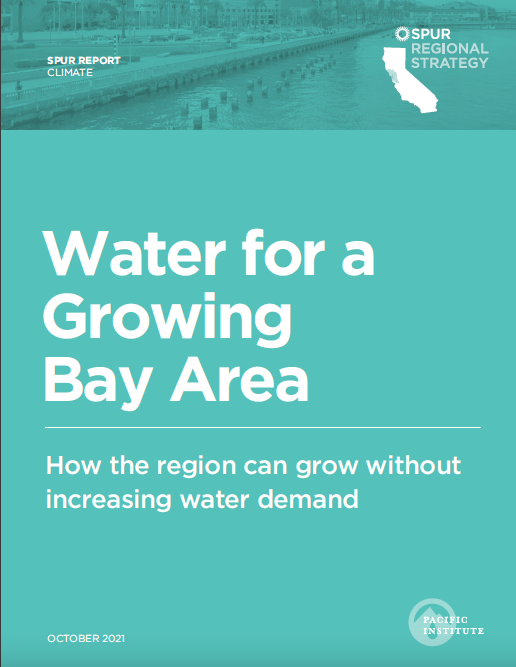
Water for a Growing Bay Area: How the Region Can Grow Without Increasing Water Demand
October 21, 2021 | publication
The San Francisco Bay Area is projected to add two million jobs by 2070, attracting millions more people. To prevent housing from becoming even more unaffordable, the region needs to build 2.2 million new housing units.
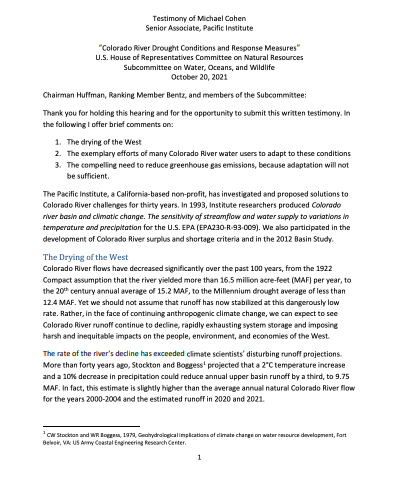
Testimony on Colorado River Drought Conditions and Response Measures to the U.S. House of Representatives Committee on Natural Resources Subcommittee on Water, Oceans, and Wildlife
October 20, 2021 | publication
Pacific Institute Senior Researcher Michael Cohen submitted written testimony to the U.S. House of Representatives Committee on Natural Resources Subcommittee on Water, Oceans, and Wildlife for their October 20, 2021 hearing on drought conditions in the Colorado River Basin and potential response measures.
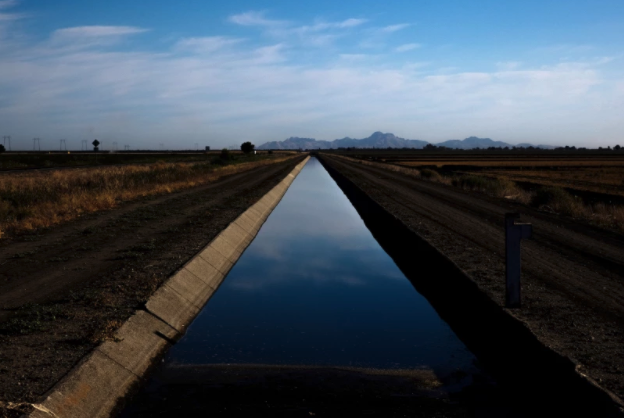
Op-Ed: Happy New Water Year — Californians Have to Face Some Difficult Wet Season Truths
October 4, 2021 | publication
Happy New Water Year. For those of us who work on California water challenges, the start of the new year isn’t Jan. 1; it’s Oct. 1, the official beginning of the state’s wet season.
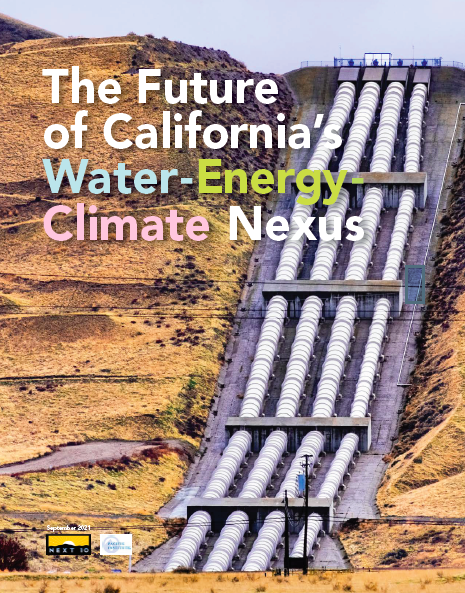
The Future of California’s Water-Energy-Climate Nexus
September 9, 2021 | publication
Water and energy are inextricably linked in California and, as one resource faces constraints or challenges, so does the other. With the state looking to both reach its climate change goals and decarbonize its economy through a transition to 100 percent clean energy, water will play an integral role.
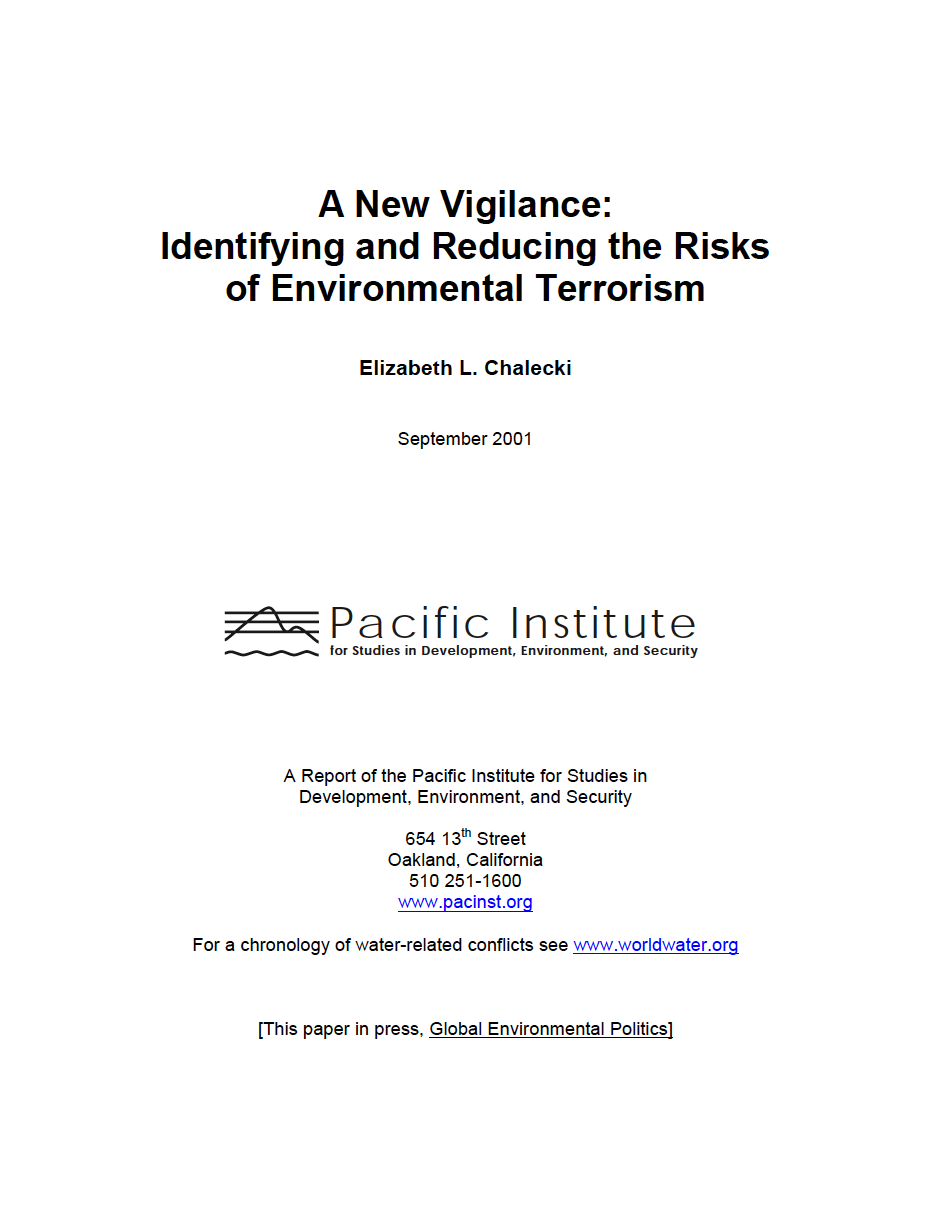
A New Vigilance: Identifying and Reducing the Risks of Environmental Terrorism
September 1, 2021 | publication
Environmental terrorism is an old type of conflict with a new face. Large, costly wars
between two or more states have become less prevalent over the past 50 years, and with the end
of the Cold War and the demise of the Soviet Union, there has been no bipolar superpower
standoff to suppress the many ethnic, religious, and multipolar political and cultural tensions that
motivate terrorist actions.
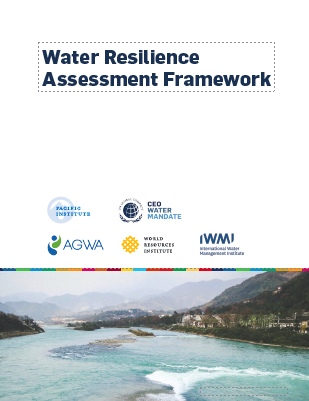
Water Resilience Assessment Framework
August 24, 2021 | publication
Climate change is driving many types of water challenges, including water scarcity and abundance, worsening water quality, and shifts in timing of the hydrologic cycle. Shocks and stresses affect the resilience of water systems and the stakeholders that rely on them. Specific guidance on how to understand system resilience and measure systematic changes and intervening actions can ensure a more resilient future for all.

Comments on the California Public Utilities Commission Amended Scope for a Low Income Water Rates Assistance Program
August 11, 2021 | publication
This letter from the Center for Accessible Technology; Pacific Institute for Studies in Development, Environment, and Security; Natural Resources Defense Council; The Environmental Justice Coalition for Water; Community Water Center; and Leadership Counsel for Justice and Accountability (collectively the Joint Advocates) contains comments on the California Public Utilities Commission Amended Scope for a Low Income Water Rates Assistance Program.

Op-Ed: Dying from the Heat
July 2, 2021 | publication
No one wants to be a statistic in a climate disaster—an anonymous entry in a dataset of extreme events. But sometimes things sneak up on you. A couple of weeks ago, during one of the extraordinary and severe heat events striking western North America, I almost suffered from heat stroke.
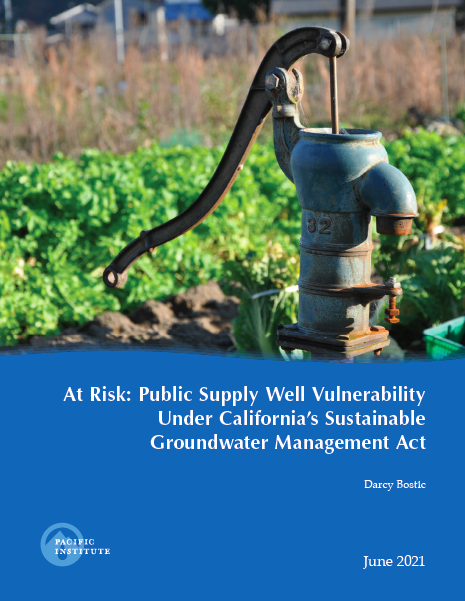
At Risk: Public Supply Well Vulnerability Under California’s Sustainable Groundwater Management Act
June 21, 2021 | publication
Community water systems in California’s San Joaquin Valley face a host of challenges that threaten the safety and reliability of drinking water, including pollution, periodic drought, and chronic groundwater overdraft. Moreover, shallow wells, some of which serve community water systems, are vulnerable to short-term and chronic declines in groundwater levels. For example, during the 2012-2016 drought, many domestic wells and some public supply wells went dry.
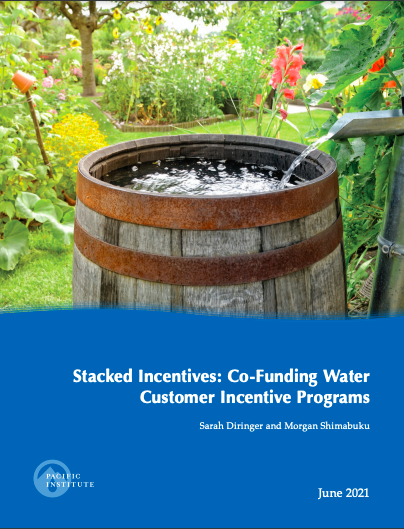
Stacked Incentives: Co-Funding Water Customer Incentive Programs
June 8, 2021 | publication
Water utilities throughout the United States offer customer incentives to motivate action and foster engagement with their customers. These incentive programs can take many forms, from rebates for high-efficiency fixtures and appliances to technical assistance for installing cisterns and rain gardens.
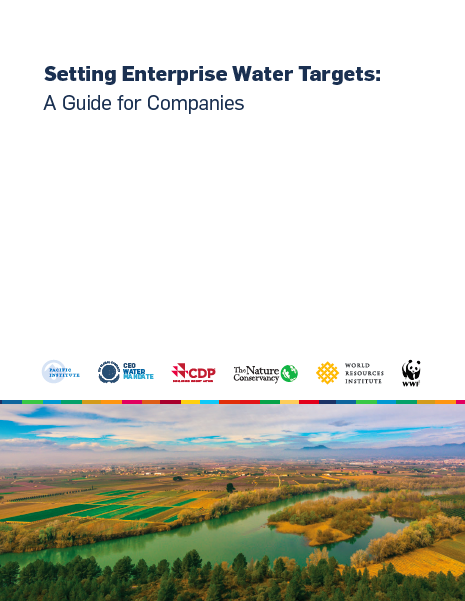
Setting Enterprise Water Targets: A Guide for Companies
May 24, 2021 | publication
The complexity of global water challenges requires meaningful action across sectors, including the business sector. A critical aspect of business engagement in successful water stewardship is setting water targets that address the shared water challenges in the water basins where a company operates, sources, and provides goods and services, and that enable actions that reduce or eliminate the associated water risks.
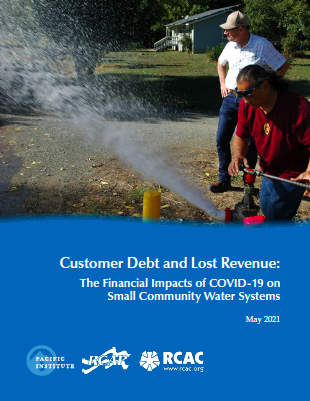
Customer Debt and Declining Revenues: The Financial Impacts of COVID-19 on Small Community Water Systems
May 13, 2021 | publication
More than 45,000 small community water systems exist in the United States. These small community water systems, defined as those serving fewer than 10,000 people, are distributed across the country. Altogether they serve 53 million people across rural and urban settings, on Tribal reservations, in the midst of huge metropolises, and in growing communities.
Page 4 of 29
From the Blog
- Feb 20, 2026
- From Davos: Scaling Business Leadership on Water Resilience
- Dec 16, 2025
- Colorado River Deadlines & Incentives
- Dec 02, 2025
- A Year-End Conversation with Jason Morrison
- Nov 13, 2025
- Pacific Institute Convenes Leaders to Accelerate Corporate Action on Water Resilience in California
- Nov 03, 2025
- Air Pollution and Health in the Coachella Valley


